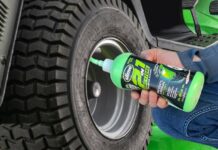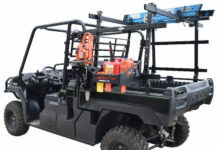Contractors cut expenses, emissions converting trucks and mowers to propane
Landscape contractors face tough challenges they can’t control: local competition, equipment issues, theft, personnel problems and rising fuel prices to name a few. Avoiding these obstacles is nearly impossible, however, implementing one change can significantly ease the burden of them all: fueling fleets with propane.
Contractors with existing propane-fueled mowers are increasingly looking to propane work trucks, generators and other equipment to cut costs and reduce emissions across operations. With a variety of options for both propane-fueled mowers and work trucks available and easily accessible training and resources, making the switch has never made more sense.
A propane pioneer
When gasoline prices skyrocketed in 2008, Eric Hansen, owner of Competitive Lawn Service in Downer’s Grove, Ill., decided to research alternative fueled equipment as a way to offset rising fuel costs. At the time, propane-fueled mowers and trucks were not prevalent in the landscaping industry, but Hansen realized the potential and converted two mowers to propane with conversion kits.
Hansen has since grown the company’s propane mower fleet to 40 Wright, Exmark and John Deere mowers with plans to convert his few remaining gasoline units. The company’s overall cost savings and success led Hansen to explore ways he could extend the benefits of propane beyond mowing. In December of 2009, Hansen purchased his first dedicated propane-fueled Ford F-350 with an under-bed propane tank from Roush CleanTech in partnership with Ford.
“I wanted to run a single fuel source in every piece of equipment,” he said. “It just made sense to be saving money across both our mower and vehicle fleets.”
Hansen estimates Competitive Lawn Service will use close to 30,000 gallons of propane this year in its mower and truck fleet. At an average of $1.50 per gallon (which is the bulk rate he negotiated with his retailer), he’ll spend $45,000 on fuel. If he bought gasoline at $3.75 (the average price in his area), he would spend more than $112,000 annually.
Hansen has been vocal about his savings with propane to colleagues in the industry. Many still lack basic education about the fuel, but even skeptics can’t argue with the economics.
“Too many landscape professionals are spending tons of money on fuel, because they don’t know or have misconceptions about their other options,” Hansen says. “I also see landscapers who have switched to propane mowers, but they’re not taking advantage of transitioning their truck fleets.”
In the driver’s seat
Many landscapers are familiar with the availability of propane-fueled mowers. Work trucks fueled with propane autogas, on the other hand, aren’t typically a first choice for landscape professionals. The first major consideration for propane autogas work trucks is deciding on a dedicated or bi-fuel vehicle. A dedicated OEM-supplied vehicle is built from the outset to run solely on propane autogas, whereas a bi-fuel vehicle is a conventional gasoline vehicle that has been converted to run on either propane autogas or gasoline.
Roush CleanTech, a Ford Qualified Vehicle Modifier (QVM), offers dedicated Ford F-250 through F-650 work trucks in addition to certified conversion kits. Both bi-fuel and dedicated propane autogas vehicles offer the same torque, horsepower and performance as the equivalent gasoline model. Todd Mouw, vice president of sales and marketing for Roush, recommends landscapers conduct thorough research and testing to find the right fit and provides a checklist of things to look for when spec’ing any propane autogas vehicle.
“Make sure the truck is Environmental Protection Agency and California Air Resources Board certified before you even think about buying,” Mouw explains to contractors. “Ask to visit the manufacturer’s facility to see what type of operation they’re running. Check the warranties and service network available and ask to test drive a vehicle for a few weeks.”
Fueling up
After choosing the right vehicle, establishing a refueling plan is the next step. “Many contractors hesitate because they don’t understand where to get the fuel or think refueling is difficult,” Mouw says. “After we explain the simple process of having infrastructure installed, they’re more apt to consider propane autogas.”
Refueling with propane offers the same ease and convenience as filling up with gasoline. The main difference is the nozzle is threaded, creating a closed fuel system that is virtually leak and theft free. While public propane autogas refueling stations are currently available in every state, installing on-site infrastructure is a cost-effective and efficient way for contractors to take advantage of propane across their mower and truck fleets.

The number of contractors choosing the propane option continues to grow.
Photo courtesy Dennis’ 7 Dees
Mouw explains that propane retailers will often install infrastructure for a minimal cost when contractors sign a fuel contract, and working one-on-one with a local propane retailer is a key part of the process.
“Propane marketers are very versatile and can offer a variety of solutions tailored to the landscapers’ business needs and estimated fuel consumption,” says Mouw. “Working with retailers alleviates stress upfront and allows contractors to maximize propane’s benefits from the start.”
Retailers can also notify contractors of state and federal grants, tax credits and programs. For instance, current federal incentives for infrastructure and fuel provide up to 30 percent of the total cost of installing a propane autogas refueling station and an extra 50 cents per gallon savings on propane autogas.
While contractors are initially drawn to propane’s low price-per-gallon, the alternative fuel is also good for the U.S. economy. More than 70 percent of propane production is coming from domestic natural gas, and the U.S. produces enough of its own propane to exceed customer demand.
“With no end in sight for high gas and diesel prices, converting mower and truck fleets to propane makes sense,” says Mouw. “Propane is the most widely available alternative fuel in the U.S. right now, and more than 17 million vehicles operate on propane autogas in the world. The reason for propane’s popularity is because it’s a clean, abundant and value-priced alternative fuel.”
Competitive advantages beyond cost
Saving money is the main reason landscape professionals adopt propane mowers and trucks, but propane boasts many additional benefits. For Competitive Lawn Service, propane has allowed Hansen to be more competitive on bids and market his alternative fuel use to new customers.
“We’re able to talk about sustainability and alternative fuels, and that differentiates us on commercial projects and has allowed us to gain contracts and grow our business,” Hansen says. “It’s difficult for contractors to differentiate themselves, but by using alternative fuels, we have that hook that sets us apart.”
Propane mowers produce 80 percent fewer carbon monoxide emissions and 50 percent fewer greenhouse gas emissions compared with gasoline mowers. Vehicles fueled with propane autogas emit 12 percent less carbon dioxide, about 20 percent less nitrogen oxide and up to 60 percent less carbon monoxide than gasoline-fueled vehicles.
Through their own experiences and testing, Hansen’s crewmembers have noted cleaner mower engines and oil, enabling them to reduce the frequency of oil changes they perform on their equipment. Additionally, Hansen says his propane trucks will undoubtedly last longer than gasoline models. In fact, he expects them to reach at least 300,000 miles.
Planning for propane adoption
David Snodgrass, president of Dennis’ 7 Dees in Portland, Ore., began assessing propane equipment earlier this year and decided to test 10 new propane mowers in his 200-mower fleet. “After researching the price of propane per gallon and learning that it’s cleaner, starts faster and is sustainable, we were ready to make the choice,” he says.
Snodgrass also plans to take advantage of the Propane Education & Research Council’s (PERC) Propane Mower Incentive Program, which offers contractors $1,000 toward the purchase of each of new propane- fueled mower and $500 toward the cost of qualified conversions.
Looking to the future, Snodgrass plans to replace his gasoline trucks with propane-fueled models. “We don’t run propane trucks yet, but any new light-duty pickups we buy in the future will be propane,” he says. “We like the bi-fuel trucks so we have the option of switching between gasoline and propane.”
At the point his company acquires propane pickups, Snodgrass looks forward to capitalizing on the reduced emissions and maintenance with propane as the company’s single fuel source. However, like Hansen and other contractors making the switch to propane as a primary fuel source, cost savings is the primary driver.
“Fuel is one of our biggest expenses,” explains Snodgrass. “And, when you look at the seasonality of propane, demand is lowest in the summer, which lowers the price and makes it a nice and affordable fit for the landscaping industry.”
Jessica Simpson is an associate with Swanson Russell, Lincoln, Neb.











![[VIDEO] Dickies®: Discover Workwear That’s Anything But Uniform](https://turfmagazine.com/wp-content/uploads/2023/06/1647663814-4b1a2a7742790a9b1e97a3b963477850192e1d6a9dfba9b07214a77bae25d6e3-d-218x150.jpg)































![[VIDEO] Dickies®: Discover Workwear That’s Anything But Uniform](https://turfmagazine.com/wp-content/uploads/2023/06/1647663814-4b1a2a7742790a9b1e97a3b963477850192e1d6a9dfba9b07214a77bae25d6e3-d-324x160.jpg)